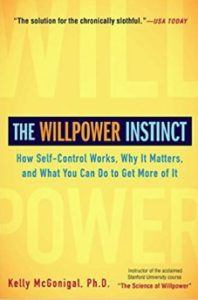In the last lesson, I talked about habit formation and how I lost weight over the summer just by eating right. I ended that lesson with this statement:
“There is a fifth key to this process of automaticity—willpower. I did not talk about willpower, but that is the topic of the next lesson.”[1]
So let’s talk about willpower. I just finished re-reading the Willpower Instinct by Stanford Professor, Kelly McGonigal. In this first lesson, I will explain how willpower related to my situation. Then, in following lessons, I will talk about how willpower works, and how our understanding of willpower often works against us and keeps us from our goals.
I am not genetically endowed with more will power than other people. In fact, I don’t think willpower was the primary cause of my success, although it was indirectly related. That is, I was not successful because I have more willpower than others.
In my situation, willpower worked for me and not against me because of how I thought about what I was doing. I was not “dieting.” Instead, I simply chose to eat food that I knew would make me feel better rather than worse. Were I dieting, I would try to not eat candy, soda, or cake for a limited time until I hit an ideal weight. That is dieting.
There are other variations — don’t eat fat, don’t drink soda, don’t eat carbs, don’t consume as many calories, etc., but all of it is a temporary salve to a permanent condition. Unfortunately, that approach would set me up for the ironic rebound effect.
The Ironic Rebound Effect
Suppose I ask you not to think of a pink elephant. What does your mind immediately do?

In trying to accommodate your request, your mind perpetually scans the environment to keep away from pink elephants, but this requires your mind to keep pink elephants ever-present in your mind. If you are asked not to think of pink elephants, you cannot help but think of pink elephants.
In the same way, there is a world of difference between telling your brain to eat what makes your body feel good (positive) and telling it to avoid eating things that taste good (negative).
This works at the office too. If you have ever given a presentation and you told yourself not to say “um,” your brain spent more time tripping you up, focusing on every “um.” You become self-conscious and your own mind works against you.
Even the Scriptures confirm this approach. In Philippians 4:8, the Apostle Paul wrote, “Finally, brothers and sisters, whatever is true, whatever is noble, whatever is right, whatever is pure, whatever is lovely, whatever is admirable—if anything is excellent or praiseworthy—think about such things.” That is different than saying, “Try really hard not to do bad stuff.”[2] The psychology of these two statements are quite different. As McGonigal wrote, “Whatever fear you try to push away will become more convincing and compelling.”[3]
I Won’t vs. I will
By choosing to eat things that made my body feel good rather than choosing to avoid sweets, I turned I won’t into I will.
Researchers at Lavel University in Quebec asked participants in a study to focus on what they should eat (I will) instead of what they should avoid (I won’t). Two thirds of the participants not only lost weight, but kept it off sixteen months later. The average dieter, in contrast, regains their lost weight in 16 days.[4]
What About You?
Because I accidentally pursued this I will path, willpower was working for me (or at very least, it was not working against me). Have you ever run up against the ironic rebound?
References
Because I accidentally pursued this I will path, willpower was working for me (or at very least, it was not working against me). Have you ever run up against the ironic rebound effect?
[1] Gerdes, D. (2019, Sep 22). Habit formation part II. Retrieved from https://www.daringerdes.com/habit-formation-part-ii/
[2] This is a bit off topic, but there is a deeper theological reason for this approach. You don’t keep God’s law by continually repeating the 10 commandments. The law only points us to our need for God (Romans 7-8). When Christ was asked which is the greatest commandment, he framed his answer positively: “‘You shall love the Lord your God with all your heart, and with all your soul, and with all your mind.’ This is the great and foremost commandment. The second is like it, ‘You shall love your neighbor as yourself.’ On these two commandments depend the whole Law and the Prophets.” (Matthew 22:37-40).
[3] McGonigal, K. (2012). The willpower instinct: How self-control works, why it matters, and what you can do to get more of it. New York: Avery. (pp. 213-214).
[4] McGonigal, K. (2012). The willpower instinct: How self-control works, why it matters, and what you can do to get more of it. New York: Avery. (p. 227).
___________

Dr. Darin Gerdes is a tenured Professor of Management in the College of Business at Charleston Southern University.
All ideas expressed on www.daringerdes.com are his own.
This post was originally created for Great Business Networking (GBN), a networking organization for business professionals where Dr. Gerdes is the Director of Education.
___________

